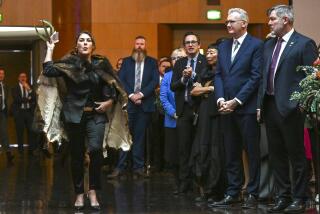Unrest Growing Among Australia’s Aborigines : Widespread Racism Traps Many of Nation’s Native Blacks in Poverty, Squalor
SYDNEY, Australia — A High Court judge wept as he listened to harrowing accounts of racism against Aborigines in Australia’s outback towns.
“I have been to Soweto in South Africa, to German concentration camps, but this is my own country,” he exclaimed after trudging through ankle-deep mud to inspect 40 hovels, home to 500 Aborigines in the Toomelah settlement in New South Wales.
Australians, gearing up to celebrate 200 years of white settlement, are facing the unpalatable truth that colonization has done little to improve the lot of the continent’s only indigenous people.
Most white Australians acknowledge that prejudice against the 160,000 Aborigines is rife. Unlike recent arrivals from Asia and Europe, Aborigines have never been integrated into the population.
Problem Glossed Over
But until recently the country had preferred to gloss over the Aboriginal problem.
A recent cartoon strip in the Sydney Morning Herald summed up prevalent attitudes among young Australians, many of whom are quick to accuse foreign governments of oppression.
A young couple, reading about conditions at Toomelah over breakfast, agree it’s awful, a disgrace. “Sometimes I feel so ashamed to be white,” they said.
They weep into their hands for two frames. “There, I feel much better for that,” says the man. “Croissant?” asks his partner.
New Militancy
However, people are being forced to take notice as a new militancy among Aborigines has led to fears of warfare in some bush towns and disruption of the bicentennial celebrations.
The militants’ spokesman is Aboriginal lawyer Michael Mansell, who caused a furor earlier this year when he attended a conference of revolutionary forces in Libya.
On his return, Mansell demanded negotiations on sovereignty for Aborigines, a legislative program to overcome discrimination and the scrapping of bicentennial celebrations.
Mansell warned that if nothing positive happens within the next few months, he will feel justified in returning to Libya and seeking funds for Aboriginal groups.
Right Commission Probe
The injustices faced by Aborigines, who make up 1% of the population, were given a nationwide airing during a recent investigation by the Australian Human Rights Commission into living conditions at Toomelah.
The settlements, normally located in outback areas, were created by the government over the last 20 years to cater to the Aboriginal way of life. They were intended to allow Aborigines to maintain their traditions while providing opportunities to integrate with the rest of the community.
Justice Marcus Einfeld listened to four days of evidence from local people about the background of a riot last January when 100 Aborigines crossed the border into Queensland and swept through the town of Goondiwindi.
Aborigines told of raw sewage collecting in open ponds, 80% unemployment, running water limited to 30 minutes a day and chronic overcrowding.
Unbridled Prejudice
Shocked by the neglect, Einfeld said: “There may not be high fences or SS guards around Toomelah, but if you live in a house with 21 others, cannot get out of town because the road is impassable or cannot get work, you live in a prison.”
But it was the evidence of unbridled prejudice by local white people that triggered the judge’s tears.
Goondiwindi High School reserved a “blackie’s” blackboard for Aborigines, and young Aborigines were seated separately from whites, pupils said.
One former teacher told of white children naming their favorite weekend sport as “nigger hunting.”
Government Inquiry
“It’s shameful. Other Australian people wouldn’t tolerate it,” Einfeld said.
Similar sentiments were expressed by civil rights organizations concerned about 35 Aboriginal deaths in jails since 1983.
“If this number of whites died in custody, there would be a major scandal,” said Vanessa Forrest, spokeswoman for the Committee to Defend Black Rights.
The government recently acted to quell mounting disquiet by setting up a government inquiry.
Blood Bath Feared
Three Supreme Court judges will investigate the deaths of 15 young Aborigines who died within hours of incarceration over the last eight months.
Federal politicians warn that increasing Aboriginal militancy could lead to a blood bath in some outback towns.
“The hatred in these places is unbelievable, and many whites already live in fear they will be bashed or robbed,” said David Connolly, opposition Aboriginal affairs spokesman.
“Something must be done now or it will all simply boil over and we’ll have even worse trouble on our hands,” he said.
Leadership Needed
Connolly said the federal government had “done its bit,” providing services and trying to improve conditions for Aborigines. He said it was also important that Aborigines build up leadership in their communities.
Einfeld, who will also head the commission investigating the jail deaths, believes the position of Aborigines can be improved only by a change of attitude among white Australians.
“The so-called Aboriginal problem is in truth not primarily Aboriginal. . . . It is the age-old disease of racism, elitism and discrimination,” Einfeld said. “Before Australia takes the high moral ground on various questions of human rights, “it is well that Australians, all of us, should see that Toomelah exists because of us and what we are as Australians.”
More to Read
Sign up for Essential California
The most important California stories and recommendations in your inbox every morning.
You may occasionally receive promotional content from the Los Angeles Times.










